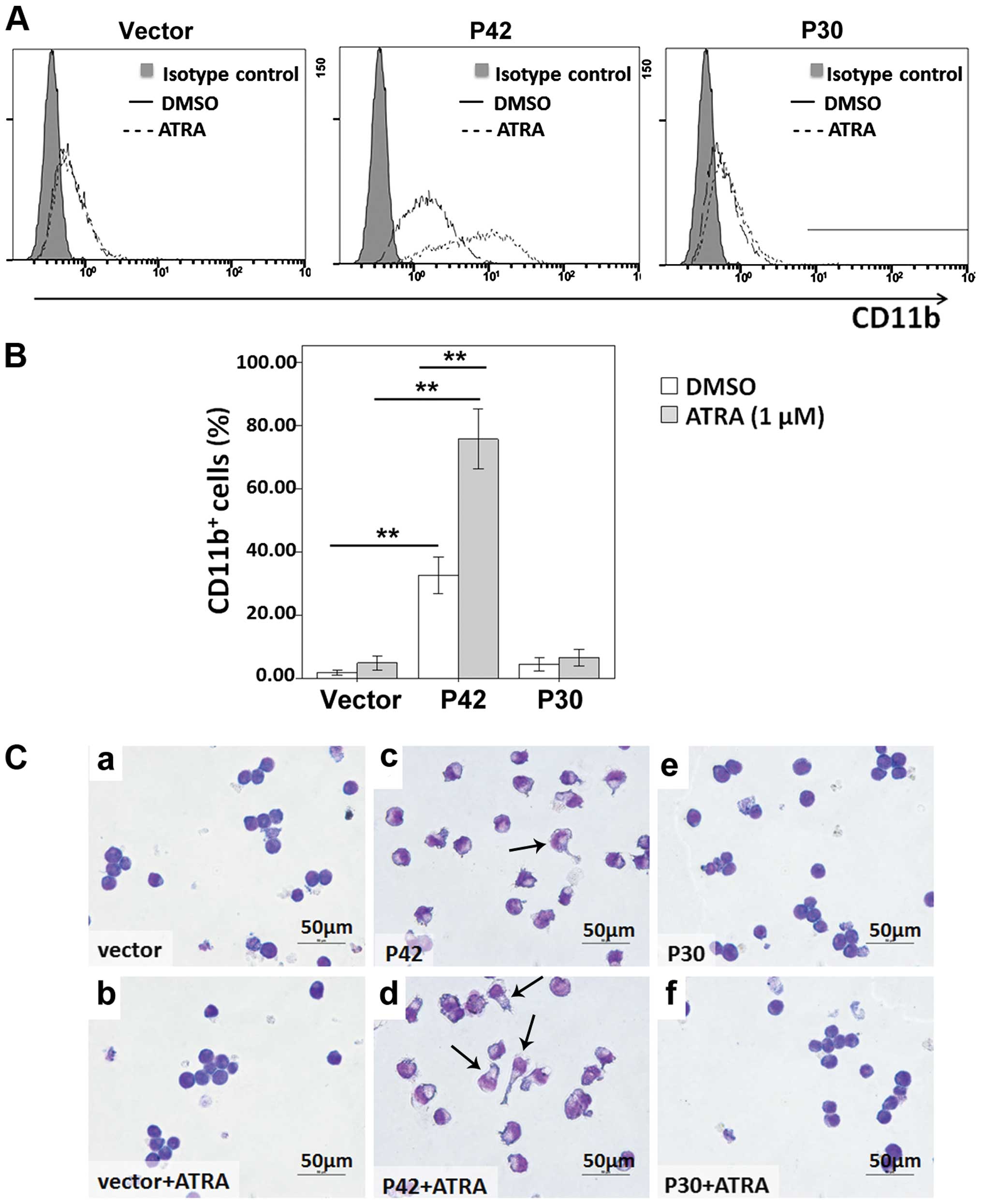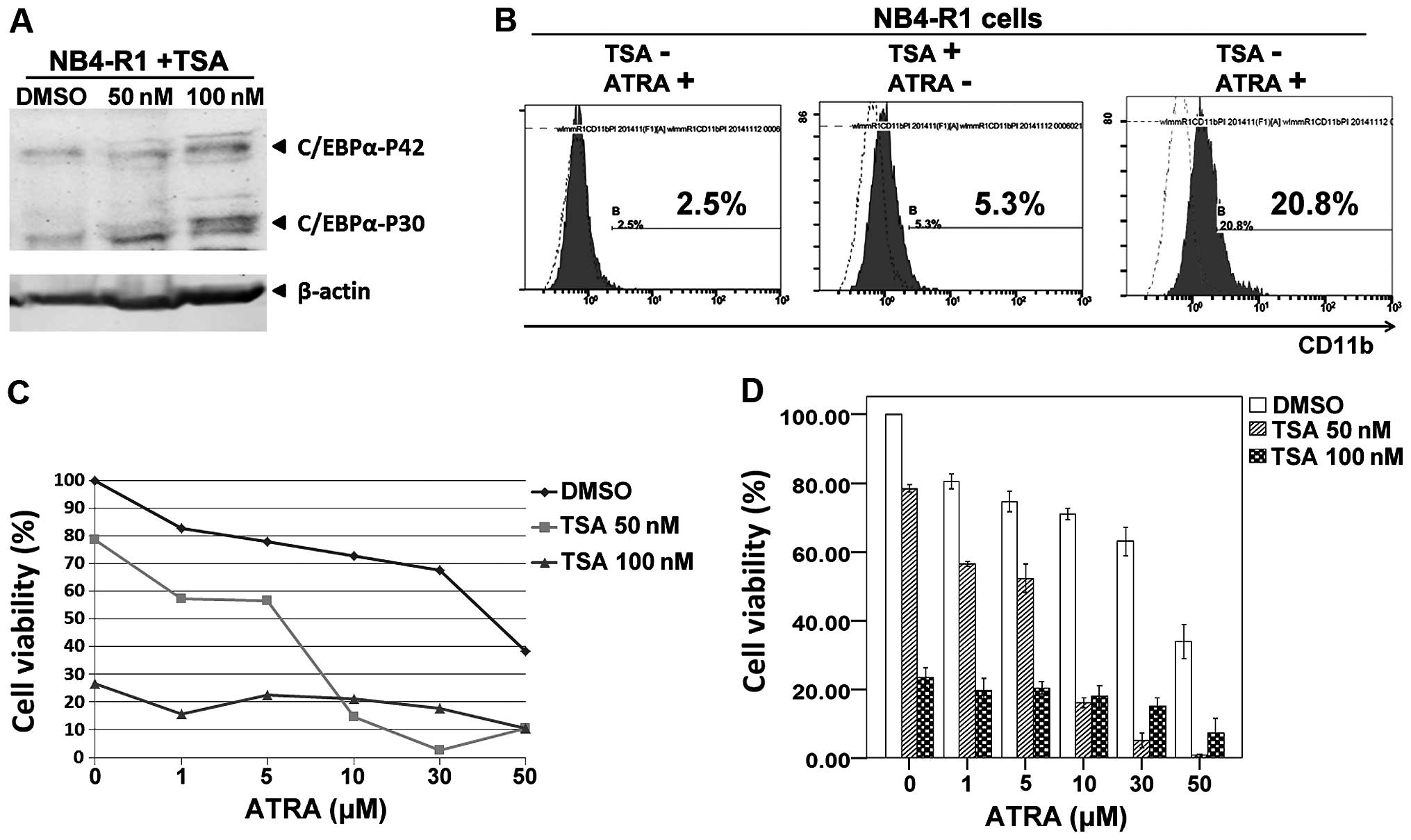|
1
|
Rowley JD: Mapping of human chromosomal
regions related to neoplasia: Evidence from chromosomes 1 and 17.
Proc Natl Acad Sci USA. 74:5729–5733. 1977. View Article : Google Scholar : PubMed/NCBI
|
|
2
|
de Thé H, Chomienne C, Lanotte M, Degos L
and Dejean A: The t(15;17) translocation of acute promyelocytic
leukaemia fuses the retinoic acid receptor alpha gene to a novel
transcribed locus. Nature. 347:558–561. 1990. View Article : Google Scholar : PubMed/NCBI
|
|
3
|
de Thé H, Lavau C, Marchio A, Chomienne C,
Degos L and Dejean A: The PML-RAR alpha fusion mRNA generated by
the t(15;17) translocation in acute promyelocytic leukemia encodes
a functionally altered RAR. Cell. 66:675–684. 1991. View Article : Google Scholar : PubMed/NCBI
|
|
4
|
Grignani F, De Matteis S, Nervi C,
Tomassoni L, Gelmetti V, Cioce M, Fanelli M, Ruthardt M, Ferrara
FF, Zamir I, et al: Fusion proteins of the retinoic acid
receptor-alpha recruit histone deacetylase in promyelocytic
leukaemia. Nature. 391:815–818. 1998. View
Article : Google Scholar : PubMed/NCBI
|
|
5
|
Villa R, Pasini D, Gutierrez A, Morey L,
Occhionorelli M, Viré E, Nomdedeu JF, Jenuwein T, Pelicci PG,
Minucci S, et al: Role of the polycomb repressive complex 2 in
acute promyelocytic leukemia. Cancer Cell. 11:513–525. 2007.
View Article : Google Scholar : PubMed/NCBI
|
|
6
|
Wang Y, Jin W, Jia X, Luo R, Tan Y, Zhu X,
Yang X, Wang X and Wang K: Transcriptional repression of CDKN2D by
PML/RARα contributes to the altered proliferation and
differentiation block of acute promyelocytic leukemia cells. Cell
Death Dis. 5:e14312014. View Article : Google Scholar
|
|
7
|
Bräuer-Hartmann D, Hartmann JU, Wurm AA,
Gerloff D, Katzerke C, Verga Falzacappa MV, Pelicci PG,
Müller-Tidow C, Tenen DG, Niederwieser D, et al: PML/RARα-regulated
miR-181a/b cluster targets the tumor suppressor RASSF1A in acute
promyelocytic leukemia. Cancer Res. 75:3411–3424. 2015. View Article : Google Scholar
|
|
8
|
Degos L, Dombret H, Chomienne C, Daniel
MT, Micléa JM, Chastang C, Castaigne S and Fenaux P:
All-trans-retinoic acid as a differentiating agent in the treatment
of acute promyelocytic leukemia. Blood. 85:2643–2653.
1995.PubMed/NCBI
|
|
9
|
Efficace F, Mandelli F, Avvisati G,
Cottone F, Ferrara F, Di Bona E, Specchia G, Breccia M, Levis A,
Sica S, et al: Randomized phase III trial of retinoic acid and
arsenic trioxide versus retinoic acid and chemotherapy in patients
with acute promyelocytic leukemia: Health-related quality-of-life
outcomes. J Clin Oncol. 32:3406–3412. 2014. View Article : Google Scholar : PubMed/NCBI
|
|
10
|
Tomita A, Kiyoi H and Naoe T: Mechanisms
of action and resistance to all-trans retinoic acid (ATRA) and
arsenic trioxide (As2O3) in acute
promyelocytic leukemia. Int J Hematol. 97:717–725. 2013. View Article : Google Scholar : PubMed/NCBI
|
|
11
|
Arnould C, Philippe C, Bourdon V, Gr goire
MJ, Berger R and Jonveaux P: The signal transducer and activator of
transcription STAT5b gene is a new partner of retinoic acid
receptor alpha in acute promyelocytic-like leukaemia. Hum Mol
Genet. 8:1741–1749. 1999. View Article : Google Scholar : PubMed/NCBI
|
|
12
|
Ozpolat B, Mehta K, Tari AM and
Lopez-Berestein G: All-trans-retinoic acid-induced expression and
regulation of retinoic acid 4-hydroxylase (CYP26) in human
promyelocytic leukemia. Am J Hematol. 70:39–47. 2002. View Article : Google Scholar : PubMed/NCBI
|
|
13
|
Su M, Alonso S, Jones JW, Yu J, Kane MA,
Jones RJ and Ghiaur G: All-trans retinoic acid activity in acute
myeloid leukemia: Role of cytochrome P450 enzyme expression by the
microenvironment. PLoS One. 10:e01277902015. View Article : Google Scholar : PubMed/NCBI
|
|
14
|
Zhou DC, Hallam SJ, Lee SJ, Klein RS,
Wiernik PH, Tallman MS and Gallagher RE: Constitutive expression of
cellular retinoic acid binding protein II and lack of correlation
with sensitivity to all-trans retinoic acid in acute promyelocytic
leukemia cells. Cancer Res. 58:5770–5776. 1998.PubMed/NCBI
|
|
15
|
Côté S, Zhou D, Bianchini A, Nervi C,
Gallagher RE and Miller WH Jr: Altered ligand binding and
transcriptional regulation by mutations in the PML/RARalpha
ligand-binding domain arising in retinoic acid-resistant patients
with acute promyelocytic leukemia. Blood. 96:3200–3208.
2000.PubMed/NCBI
|
|
16
|
Gallagher RE, Moser BK, Racevskis J, Poiré
X, Bloomfield CD, Carroll AJ, Ketterling RP, Roulston D,
Schachter-Tokarz E, Zhou DC, et al: Treatment-influenced
associations of PML-RARα mutations, FLT3 mutations, and additional
chromosome abnormalities in relapsed acute promyelocytic leukemia.
Blood. 120:2098–2108. 2012. View Article : Google Scholar : PubMed/NCBI
|
|
17
|
Shen ZX, Chen GQ, Ni JH, Li XS, Xiong SM,
Qiu QY, Zhu J, Tang W, Sun GL, Yang KQ, et al: Use of arsenic
trioxide (As2O3) in the treatment of acute
promyelocytic leukemia (APL): II. Clinical efficacy and
pharmacokinetics in relapsed patients. Blood. 89:3354–3360.
1997.PubMed/NCBI
|
|
18
|
Ge DZ, Sheng Y and Cai X: Combined
staurosporine and retinoic acid induces differentiation in retinoic
acid resistant acute promyelocytic leukemia cell lines. Sci Rep.
4:48212014. View Article : Google Scholar : PubMed/NCBI
|
|
19
|
Liu T, Men Q, Wu G, Yu C, Huang Z, Liu X
and Li W: Tetrandrine induces autophagy and differentiation by
activating ROS and Notch1 signaling in leukemia cells. Oncotarget.
6:7992–8006. 2015. View Article : Google Scholar : PubMed/NCBI
|
|
20
|
Liu L, Liu L, Leung LH, Cooney AJ, Chen C,
Rosengart TK, Ma Y and Yang J: Knockdown of SALL4 protein enhances
all-trans retinoic acid-induced cellular differentiation in acute
myeloid leukemia cells. J Biol Chem. 290:10599–10609. 2015.
View Article : Google Scholar : PubMed/NCBI
|
|
21
|
Heo SK, Noh EK, Yoon DJ, Jo JC, Koh S,
Baek JH, Park JH, Min YJ and Kim H: Rosmarinic acid potentiates
ATRA-induced macrophage differentiation in acute promyelocytic
leukemia NB4 cells. Eur J Pharmacol. 747:36–44. 2015. View Article : Google Scholar
|
|
22
|
Suh HC, Gooya J, Renn K, Friedman AD,
Johnson PF and Keller JR: C/EBPalpha determines hematopoietic cell
fate in multipotential progenitor cells by inhibiting erythroid
differentiation and inducing myeloid differentiation. Blood.
107:4308–4316. 2006. View Article : Google Scholar : PubMed/NCBI
|
|
23
|
Zhang P, Iwasaki-Arai J, Iwasaki H, Fenyus
ML, Dayaram T, Owens BM, Shigematsu H, Levantini E, Huettner CS,
Lekstrom-Himes JA, et al: Enhancement of hematopoietic stem cell
repopulating capacity and self-renewal in the absence of the
transcription factor C/EBP alpha. Immunity. 21:853–863. 2004.
View Article : Google Scholar : PubMed/NCBI
|
|
24
|
McClellan JS, Dove C, Gentles AJ, Ryan CE
and Majeti R: Reprogramming of primary human Philadelphia
chromosome-positive B cell acute lymphoblastic leukemia cells into
nonleukemic macrophages. Proc Natl Acad Sci USA. 112:4074–4079.
2015. View Article : Google Scholar : PubMed/NCBI
|
|
25
|
Pabst T and Mueller BU: Complexity of
CEBPA dysregulation in human acute myeloid leukemia. Clin Cancer
Res. 15:5303–5307. 2009. View Article : Google Scholar : PubMed/NCBI
|
|
26
|
Lin FT, MacDougald OA, Diehl AM and Lane
MDA: A 30-kDa alternative translation product of the CCAAT/enhancer
binding protein alpha message: Transcriptional activator lacking
antimitotic activity. Proc Natl Acad Sci USA. 90:9606–9610. 1993.
View Article : Google Scholar : PubMed/NCBI
|
|
27
|
Pabst T, Mueller BU, Zhang P, Radomska HS,
Narravula S, Schnittger S, Behre G, Hiddemann W and Tenen DG:
Dominant-negative mutations of CEBPA, encoding CCAAT/enhancer
binding protein-alpha (C/EBPalpha), in acute myeloid leukemia. Nat
Genet. 27:263–270. 2001. View
Article : Google Scholar : PubMed/NCBI
|
|
28
|
Kuo YY, Hou HA, Chen YK, Li LY, Chen PH,
Tseng MH, Huang CF, Lee FY, Liu MC, Liu CW, et al: The N-terminal
CEBPA mutant in acute myeloid leukemia impairs CXCR4 expression.
Haematologica. 99:1799–1807. 2014. View Article : Google Scholar : PubMed/NCBI
|
|
29
|
Pulikkan JA, Dengler V, Peer Zada AA,
Kawasaki A, Geletu M, Pasalic Z, Bohlander SK, Ryo A, Tenen DG and
Behre G: Elevated PIN1 expression by C/EBPalpha-p30 blocks
C/EBPalpha-induced granulocytic differentiation through c-Jun in
AML. Leukemia. 24:914–923. 2010. View Article : Google Scholar : PubMed/NCBI
|
|
30
|
Hickey CJ, Schwind S, Radomska HS,
Dorrance AM, Santhanam R, Mishra A, Wu YZ, Alachkar H, Maharry K,
Nicolet D, et al: Lenalidomide-mediated enhanced translation of
C/EBPα-p30 protein up-regulates expression of the antileukemic
microRNA-181a in acute myeloid leukemia. Blood. 121:159–169. 2013.
View Article : Google Scholar :
|
|
31
|
Hughes JM, Legnini I, Salvatori B,
Masciarelli S, Marchioni M, Fazi F, Morlando M, Bozzoni I and
Fatica A: C/EBPα-p30 protein induces expression of the oncogenic
long non-coding RNA UCA1 in acute myeloid leukemia. Oncotarget.
6:18534–18544. 2015. View Article : Google Scholar : PubMed/NCBI
|
|
32
|
Koschmieder S, D'Alò F, Radomska H,
Schöneich C, Chang JS, Konopleva M, Kobayashi S, Levantini E, Suh
N, Di Ruscio A, et al: CDDO induces granulocytic differentiation of
myeloid leukemic blasts through translational up-regulation of p42
CCAAT enhancer binding protein alpha. Blood. 110:3695–3705. 2007.
View Article : Google Scholar : PubMed/NCBI
|
|
33
|
Westendorf JJ, Yamamoto CM, Lenny N,
Downing JR, Selsted ME and Hiebert SW: The t(8;21) fusion product,
AML-1-ETO, associates with C/EBP-alpha, inhibits
C/EBP-alpha-dependent transcription, and blocks granulocytic
differentiation. Mol Cell Biol. 18:322–333. 1998.PubMed/NCBI
|
|
34
|
Cilloni D, Carturan S, Gottardi E, Messa
F, Messa E, Fava M, Diverio D, Guerrasio A, Lo-Coco F and Saglio G:
Down-modulation of the C/EBPalpha transcription factor in core
binding factor acute myeloid leukemias. Blood. 102:2705–2706. 2003.
View Article : Google Scholar : PubMed/NCBI
|
|
35
|
Santana-Lemos BA, de Lima Lange AP, de
Lira Benício MT, José TD, Lucena-Araújo AR, Krause A, Thomé CH and
Rego EM: The CEBPA gene is down-regulated in acute promyelocytic
leukemia and its upstream promoter, but not the core promoter, is
highly methylated. Haematologica. 96:617–620. 2011. View Article : Google Scholar :
|
|
36
|
Helbling D, Mueller BU, Timchenko NA,
Schardt J, Eyer M, Betts DR, Jotterand M, Meyer-Monard S, Fey MF
and Pabst T: CBFB-SMMHC is correlated with increased calreticulin
expression and suppresses the granulocytic differentiation factor
CEBPA in AML with inv(16). Blood. 106:1369–1375. 2005. View Article : Google Scholar : PubMed/NCBI
|
|
37
|
Sun XJ, Wang Z, Wang L, Jiang Y, Kost N,
Soong TD, Chen WY, Tang Z, Nakadai T, Elemento O, et al: A stable
transcription factor complex nucleated by oligomeric AML1-ETO
controls leukaemogenesis. Nature. 500:93–97. 2013. View Article : Google Scholar : PubMed/NCBI
|
|
38
|
McIvor Z, Hein S, Fiegler H, Schroeder T,
Stocking C, Just U and Cross M: Transient expression of PU.1
commits multipotent progenitors to a myeloid fate whereas continued
expression favors macrophage over granulocyte differentiation. Exp
Hematol. 31:39–47. 2003. View Article : Google Scholar : PubMed/NCBI
|
|
39
|
Dahl R and Simon MC: The importance of
PU.1 concentration in hematopoietic lineage commitment and
maturation. Blood Cells Mol Dis. 31:229–233. 2003. View Article : Google Scholar : PubMed/NCBI
|
|
40
|
Iriyama N, Yuan B, Yoshino Y, Hatta Y,
Horikoshi A, Aizawa S, Takei M, Takeuchi J, Takagi N and Toyoda H:
Enhancement of differentiation induction and upregulation of
CCAAT/enhancer-binding proteins and PU.1 in NB4 cells treated with
combination of ATRA and valproic acid. Int J Oncol. 44:865–873.
2014.PubMed/NCBI
|
|
41
|
Friedman AD, Keefer JR, Kummalue T, Liu H,
Wang QF and Cleaves R: Regulation of granulocyte and monocyte
differentiation by CCAAT/enhancer binding protein alpha. Blood
Cells Mol Dis. 31:338–341. 2003. View Article : Google Scholar : PubMed/NCBI
|
|
42
|
Spiekermann K, Bagrintseva K, Schwab R,
Schmieja K and Hiddemann W: Overexpression and constitutive
activation of FLT3 induces STAT5 activation in primary acute
myeloid leukemia blast cells. Clin Cancer Res. 9:2140–2150.
2003.PubMed/NCBI
|
|
43
|
Zheng R, Levis M, Piloto O, Brown P,
Baldwin BR, Gorin NC, Beran M, Zhu Z, Ludwig D, Hicklin D, et al:
FLT3 ligand causes autocrine signaling in acute myeloid leukemia
cells. Blood. 103:267–274. 2004. View Article : Google Scholar
|



















